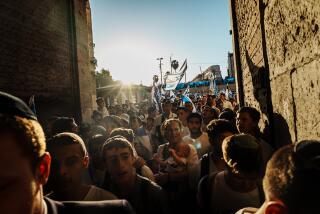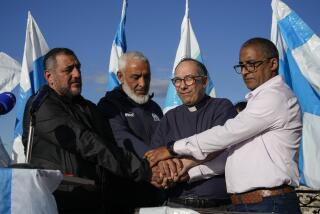MIDDLE EAST : Holy City’s Unity Fragile 25 Years Later : Israel’s 1967 conquest of then-divided Jerusalem during the Six-Day War hasn’t led to harmony. Disputes pit Jews against Arabs--and each other.
- Share via
JERUSALEM — Israel celebrated its quarter-century hold on Jerusalem this week, but along with the fireworks and pomp, acrimonious debate broke out over just whose city it is.
Obvious points of dispute were voiced by Israelis and Palestinians, the Arabs contending that, despite Israel’s assertion of sovereignty, the Israeli capital is divided and the eastern half rightfully belongs to them.
“Israelis are celebrating under the slogan of a unified Jerusalem. But everyone sees this is not a united city in any way, shape or form. One part is under occupation and another part is not,” said Faisal Husseini, a top Palestinian political leader.
Prime Minister Yitzhak Shamir, in a celebration speech, called the case closed and shut off all consideration that Palestinians could some day claim any part of Jerusalem as their own capital. “Our capital is one, Jerusalem, forever. Never will it be a capital for a foreign power,” Shamir said.
Nothing much new in that. Israel won the eastern districts of the city in 1967 after driving Jordanian troops out of Jerusalem and the rest of the West Bank. It declared the city forever united under Israeli rule.
Palestinians, now numbering about 160,000 out of a total population of 500,000, cling to the hope that they can set up their own capital in the eastern districts under a future peace agreement. The penetration of the Arab uprising into Palestinian neighborhoods has created a de facto geography of separation in the city.
If anything, the Israeli-Palestinian debate was exceeded in intensity by arguments among Israelis over the future face of the city. All sides agree that Israel must maintain its sovereignty.
But liberals, led by longtime Jerusalem Mayor Teddy Kollek, regard Jerusalem as a mosaic of separate communities that are best left in pieces for tranquillity. Right-wing nationalists see contiguous Arab neighborhoods as a threat to Israeli rule and have embarked on a one-way campaign to sprinkle Jewish communities in Arab districts.
Kollek regards the rightist campaign, which has included midnight evictions of Arabs from their homes, as a breach of values on which Israeli rule is based. “I think our sovereignty over this city will be proven by the way we treat minorities,” he said.
Housing Minister Ariel Sharon countered Kollek by dedicating a house in the Muslim quarter of the Old City. “There will not be one neighborhood in Jerusalem without Jews in it,” he declared.
The status of Jerusalem is a touchy issue, especially now that the Middle East peace talks, however slow-paced, are under way. Much of the world community considers the final legal status of Jerusalem to be still a matter of negotiation. The United States, among many other countries, maintains its embassy in Tel Aviv.
Palestinian leaders, in their new moderate mode, say the city should not be divided but shared, with two national capitals operating within its bounds.
Moshe Amirav, a Jewish member of the City Council, created a stir recently with a plan for such a dual-capital solution. He is circulating a plan to expand the municipal boundaries so the population of the city would be evenly divided, roughly half Israeli, half Palestinian. Israelis would be citizens of Israel and Palestinians of a Palestinian state. Separate municipal councils would be maintained, although joint committees would be set up for citywide projects.
Amirav encouraged Palestinians to vote in future municipal elections, instead of boycotting them. The Palestinians could vote in a local election, even though they have largely rejected Israeli citizenship. “They could decide the next mayor, determine the city government’s policy,” Amirav wrote.
“I know,” he concluded, “I must move beyond the idea of my city to see our city and then I will be able, as an Israeli, to reach peace and as a human being to gain justice.”
Amirav suggested that the issue of Jerusalem be put high on the agenda of peace talks and not at the bottom, where it stands because the future of the city is considered so sensitive.
Blocking such plans is high on the agenda of the Shamir government. A new settlement was fenced off on the Mount of Olives overlooking the Old City, the first stage in an effort to build a chain of Israeli communities between two established Arab neighborhoods.
A Divided City
Israel declared Jerusalem forever united under Israeli rule after driving out Jordanian troops in 1967. Its current status is under debate:
Liberals: regard Jerusalem as a mix of separate communities that are best left alone.
Right-wing nationalists: see contiguous Arab neighborhoods as a threat to Israeli rule.
Palestinians: hope they can set up their own capital in the eastern districts under a future peace agreement.
PALESTINIAN VOICE
’ . . . Everyone sees this is not a united city in any way, shape or form.’
Faisal Husseini, Palestinian political leader
NATIONALIST VOICE
‘Our capital is one, Jerusalem, forever. Never will it be a capital for a foreign power.’
Yitzhak Shamir, Israeli prime minister
More to Read
Sign up for Essential California
The most important California stories and recommendations in your inbox every morning.
You may occasionally receive promotional content from the Los Angeles Times.










